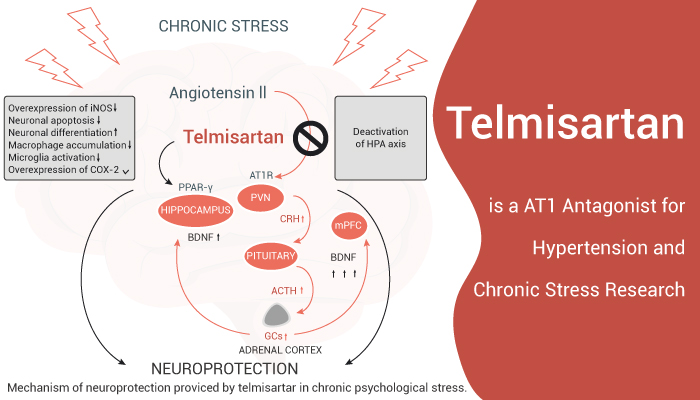Angiotensin receptors are a class of G protein-coupled receptors with angiotensin II as their ligands. They are responsible for the signal transduction of the vasoconstricting stimulus of the main effector hormone, angiotensin II. The AT1 and AT2 receptors have a similar affinity for angiotensin II, which is their main ligand. Iimportantly, AT1 has vasopressor effects and regulates aldosterone secretion. It is an important effector controlling blood pressure and volume in the cardiovascular system. Angiotensin II receptor blockers are drugs indicated for hypertension, diabetic nephropathy and congestive heart failure. On the other hand, PPARs (Peroxisome proliferator-activated receptors) are ligand-activated transcription factors of nuclear hormone receptor superfamily comprising of the following three subtypes: PPARα, PPARγ, and PPARβ/δ. Among them, PPARγ regulates fatty acid storage and glucose metabolism. The genes activated by PPARγ stimulate lipid uptake and adipogenesis by fat cells.
Telmisartan (also known as BIBR 277) is a potent, orally active angiotensin II type 1 receptor (AT1) blocker (ARB) with well-known antihypertensive properties.
Meanwhile, Telmisartan is a partial PPARγ agonist that powerfully improves endothelial function and lipid metabolism, and inhibits atherosclerosis. Moreover, Telmisartan has potential for cardiovascular disease research, and confers renoprotection. Telmisartan modulates the expression of PPARγ target genes without PPARγ-mediated adverse effects. Importantly, Several studies have indicated that angiotensin II promotes cell proliferation during cancer development, and ARBs suppress this effect by antagonizing the AT1 receptor. Besides, PPARγ activation inhibits cell growth in several cancers. Additionally, Telmisartan inhibits the proliferation of various cancer cell types, including prostate, renal and colon cancer cells, by inducing apoptosis. In human esophageal adenocarcinoma (EAC) cells, Telmisartan suppresses cells proliferation and tumor growth by inducing cell cycle arrest via the AMPK/mTOR pathway.
To sum up, Telmisartan is an orally active AT1 blocker with antihypertensive, anti-atherosclerotic and anticancer properties.
References:
[1] Maurizio Destro, et al. Expert Opin Pharmacother. 2011 Dec;12(17):2719-35.
[2] Ze-Ping Hu, et al. Fundam Clin Pharmacol. 2014 Oct;28(5):501-11.
[3] Shintaro Fujihara, et al. Oncotarget. 2017 Jan 31;8(5):8536-8549.
